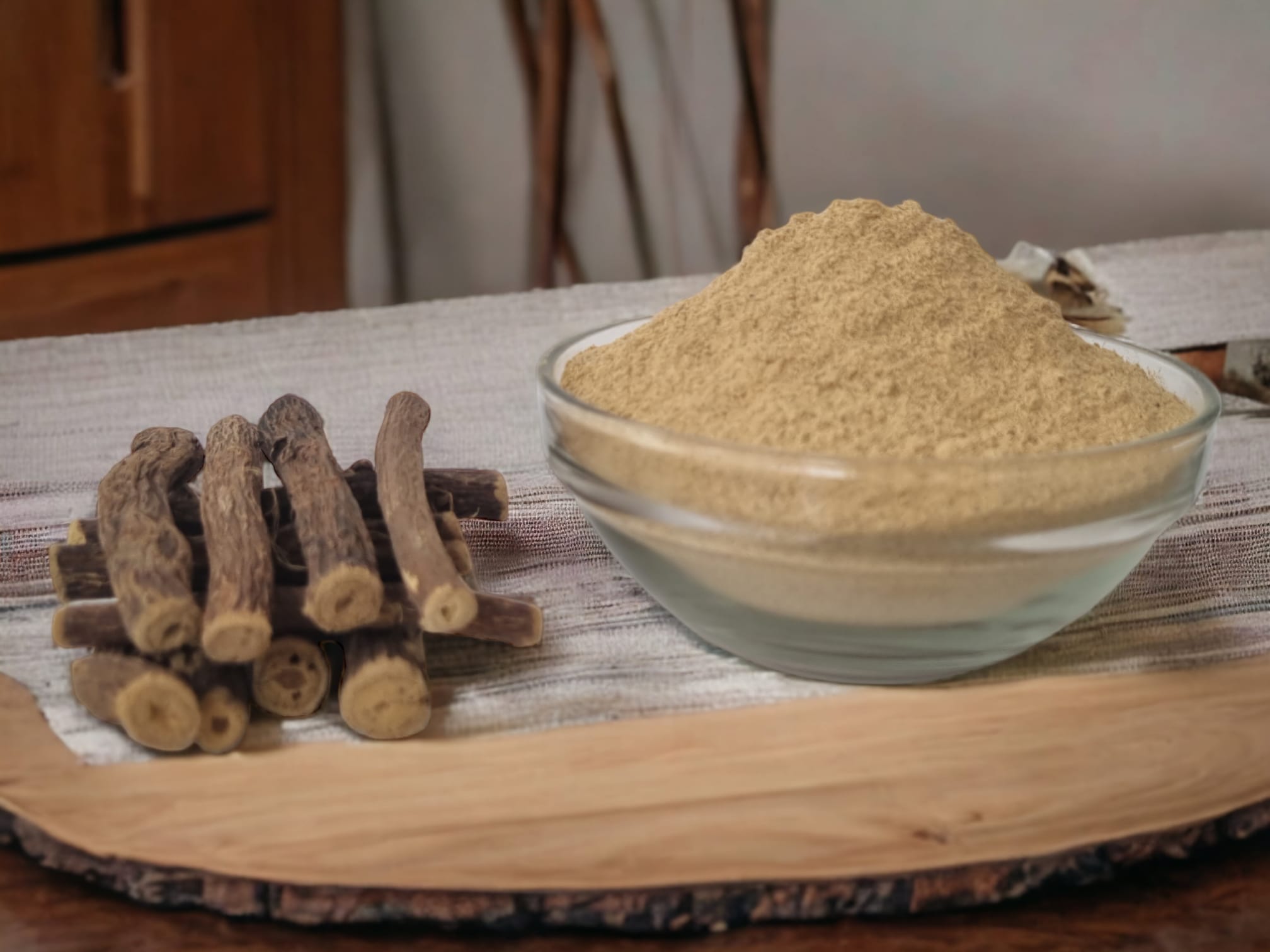
Carpolobia lutea: Sweet Chewing Stick, a Concentrate of Health and Well-being Benefits
Carpolobia lutea, also known as the “sweet chewing stick”, is a plant native to West Africa that intrigues and fascinates with its unique properties and traditional and modern uses. Wrapped in mystery and power, this legendary plant is renowned for its numerous medicinal virtues and beneficial effects on human health.
Carpolobia lutea is famous for its potent aphrodisiac effects. It is considered an effective natural remedy for boosting libido and improving sexual performance. Its ability to enhance arousal and sustain firm erections makes it a preferred sexual stimulant for both men and women.
Carpolobia Lutea: A Botanical Treasure for Men’s and Women’s Health
For centuries, men in West and Central Africa have turned to Carpolobia, a plant known for its aphrodisiac properties. But beyond its power over libido, this shrub holds many other secrets that we will explore together.
A precious botanical heritage
Carpolobia belongs to the Polygalaceae family, a fascinating group of plants that includes over 800 species. Among them, Carpolobia alba (CA) and Carpolobia lutea (CL) stand out for their healing properties and their significant role in traditional African medicine.
A Concentrate of Benefits for Men and Women
Scientific studies have revealed a multitude of virtues for the sweet chewing stick. It is notably used for:
-
- Stimulating the libido and improving sexual performance
-
- Treating male infertility
-
- Increasing aphrodisiac potency and virility
-
- Enhancing male fertility
An ancestral nugget of wisdom passed down from generation to generation
Carpolobia has been used for generations by the people of West and Central Africa. The Pygmies of Cameroon, the Yoruba, Ibo, Efik, and Ijaw peoples of Nigeria, among others, are familiar with and harness its properties to improve men’s health.
Different forms of use for various needs
-
- Chewing Sticks: Made from the stem and root, they are used to stimulate libido and improve sexual performance.
-
- Bark decoction: used to relieve headaches, general pain, and fatigue.
-
- Root maceration: consumed to unleash the aphrodisiac power of the plant.
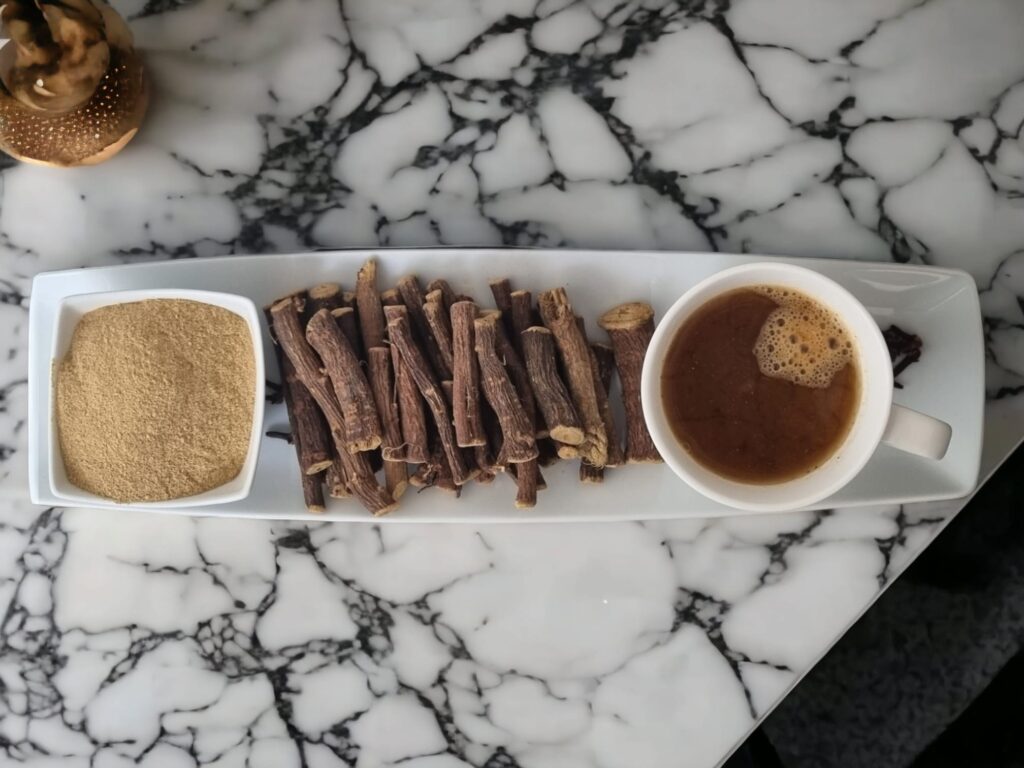
A promising future for research
Carpolobia is a true treasure of traditional African pharmacopoeia. Its richness in active ingredients and its multiple applications make it an important subject for modern research. New discoveries could help better understand its mechanisms of action and fully exploit its potential for men’s health.
Aphrodisiac properties and benefits of Carpolobia lutea / Sweet chewing stick
Carpolobia lutea is a plant rich in various bioactive compounds, including alkaloids, flavonoids, saponins, and tannins. This plant, used for generations by the people of West and Central Africa, including the Pygmies of Cameroon, the Ipassa of Gabon, and the Yoruba, Ibo, Efik, and Ijaw peoples of Nigeria, is renowned for its remarkable aphrodisiac properties.
Carpolobia Lutea belongs to the Polygalaceae family and is one of the 14 identified species of the Carpolobia genus. This small shrub, commonly used for chewing sticks made from its stem and root to enhance male sexual performance, is a phytochemical treasure trove.
Benefits of Carpolobia lutea / Sweet chewing sticks for sexual health
Carpolobia lutea is a potent natural aphrodisiac for both men and women. It boosts libido, enhances sexual performance, and aids in achieving firm erections, promoting male arousal. The plant is also known to lubricate and tighten vaginal muscles in women.
Modern scientific research is just beginning to understand and validate what traditional cultures have known for centuries. Extracts of Carpolobia lutea are rich in saponins, polyphenols, and terpenoids, compounds known for their various beneficial effects on health, including their abilities to improve sexual function.
Studies have shown that Carpolobia lutea can restore compromised sexual function in rats, suggesting a similar potential in humans. Furthermore, the traditional use of this plant to treat erectile dysfunction, increase libido, and improve male fertility is now supported by scientific evidence finally attesting to its effectiveness.
Here are some of the mechanisms of action of Carpolobia lutea / Sweet chewing stick on sexual health:
-
- Enhancement of libido: Traditional usage and preliminary studies suggest that Carpolobia lutea can increase sexual desire in men, thanks to its active compounds that stimulate libido.
-
- Restoration of erectile function: The plant has shown an ability to restore and improve erectile function, possibly by increasing blood flow to the genital organs.
-
- Increase in blood circulation: Carpolobia lutea stimulates blood flow to the genital organs, which can improve erection in men and lubrication in women.
-
- Increase in testosterone level: The plant can raise the level of testosterone, the male sex hormone, thereby enhancing libido and sexual performance.
-
- Action on neurotransmitters: Carpolobia lutea can influence the production of dopamine and serotonin, neurotransmitters involved in pleasure and sexual sensation.
-
- Improvement of male fertility: Besides its effects on libido and erectile function, Carpolobia lutea is effective in enhancing fertility by increasing the number and mobility of sperm.
-
- Antioxidant effects: The antioxidant components of this natural aphrodisiac help protect cells, including sperm cells, from oxidative damage, thus contributing to better sperm quality.
-
- Inflammatory effects: The plant’s anti-inflammatory properties may contribute to the prevention and management of inflammatory conditions in the genital organs, thus improving overall sexual health.
-
- Prevention of sexual dysfunctions: With its various beneficial effects on blood circulation, hormone levels, and cellular health, sweet chewing sticks could play a preventive role against the development of sexual dysfunctions.
-
- Overall enhancement of sexual health: By addressing multiple aspects of sexual health, this potent aphrodisiac actually contributes to overall sexual well-being.
-
- Adaptogenic properties: While requiring further research, the potential adaptogenic effects of Carpolobia lutea could assist the body in managing stress, a factor that often influences libido and sexual performance.

Beyond the aphrodisiac
But the benefits of the sweet chewing sticks don’t stop there. In addition to its aphrodisiac properties, this plant has also shown promising effects as an antimicrobial, anti-inflammatory, antidiabetic agent, and even in the treatment of ulcers and pain management. These virtues make Carpolobia lutea a versatile plant, interesting not only for improving sexual health but also for supporting overall health.
It can help, among other things, to:
-
- Improve memory and cognitive functions
-
- Reduce stress and anxiety
-
- Improving mood
-
- Combat depression
-
- The bioactive compounds of the Sweet chewing stick, such as flavonoids and saponins, can protect brain cells from oxidative damage and improve communication between neurons.
The other benefits of Carpolobia Lutea / Sweet chewing stick
Carpolobia lutea, or Sweet chewing stick, is a small shrub or tree native to Central and West Africa. Herbalists from Nigerian tribes use the root essence as an aphrodisiac and to treat genitourinary infections, gingivitis, and lower back pain.
It is also attributed with anti-inflammatory, anti-arthritic, antimicrobial, antimalarial, and analgesic properties. These properties could be particularly important in Alzheimer’s disease, as increasing evidence suggests brain inflammation in patients.
Moreover, it possesses beneficial antioxidant properties to combat free radicals – unstable atoms that can damage cells and contribute to aging and diseases, damages that can be exacerbated in Alzheimer’s disease.
Carpolobia lutea / Sweet chewing stick also has other health benefits, including:
-
- Assists in quitting smoking
-
- Increased blood circulation
-
- Treatment of canker sores
-
- Boosting the immune system
-
- Facilitating digestion and regulating intestinal flora
-
- Improvement of male and female fertility
Note: Scientific research on the benefits of Carpolobia lutea is still ongoing. However, preliminary studies have shown promising results.
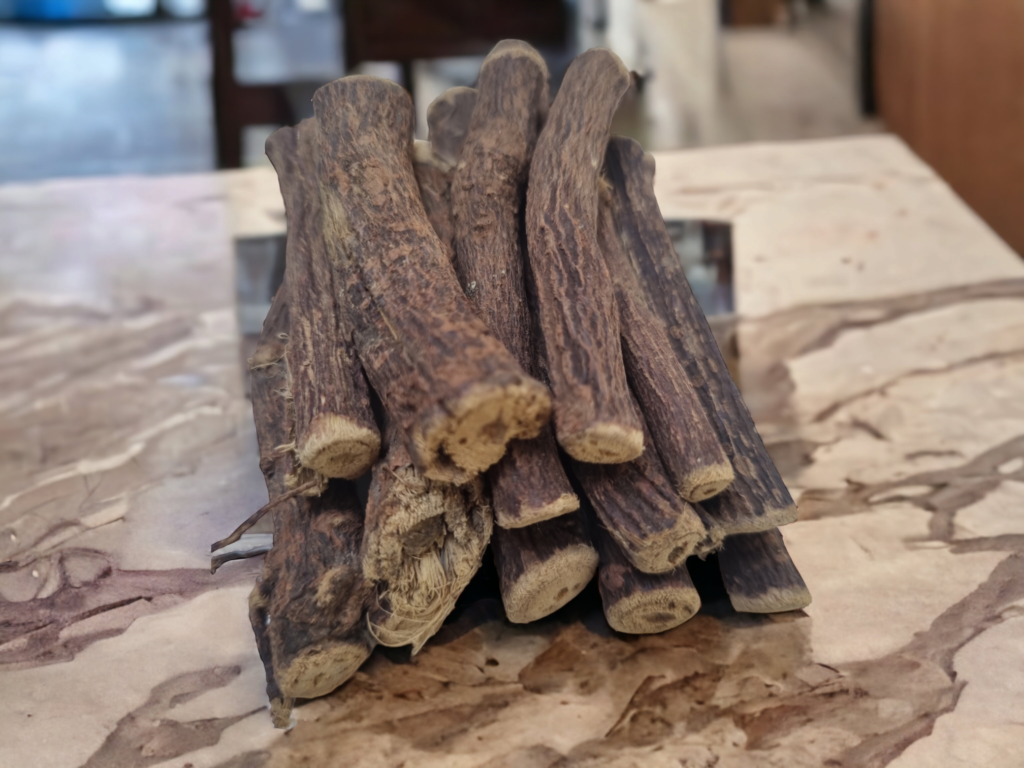
Carpolobia lutea and Alzheimer’s disease: a promising hope
A recent study conducted by the University of Nottingham offers new hope in the fight against Alzheimer’s disease. Researchers have found that Carpolobia lutea extract, a plant used for centuries in traditional Nigerian medicine, could form the basis of a new treatment.
The study, published in the journal Pharmaceutical Biology, shows that extracts from the leaves, stem, and roots of Carpolobia lutea could help protect brain chemical messengers, playing a crucial role in memory and learning. This plant extract could pave the way for new drugs targeting Alzheimer’s disease symptoms, without the undesirable side effects associated with some current treatments.
This discovery is particularly intriguing as the aging population faces a concerning rise in the number of people affected by dementia. Dr. Wayne Carter, who led the study, emphasizes that “these findings suggest that traditional medicines could provide new chemical entities capable of slowing the progression of Alzheimer’s disease.”
Neurodegenerative diseases represent a significant global health burden, putting pressure on healthcare services and affecting the lives of patients and their families. Faced with this challenge, researchers and pharmaceutical laboratories are embarking on a frantic race to discover new treatments. Plant extracts are now being considered as a potential source of new medications.
In patients with Alzheimer’s disease, as well as other conditions like Parkinson’s and myasthenia gravis, the activity of the neurotransmitter acetylcholine is reduced, leading to memory and attention disturbances. Current medications, called acetylcholinesterase inhibitors, slow down the natural breakdown of acetylcholine. Intensive research is underway to develop new versions of these medications with additional beneficial properties.
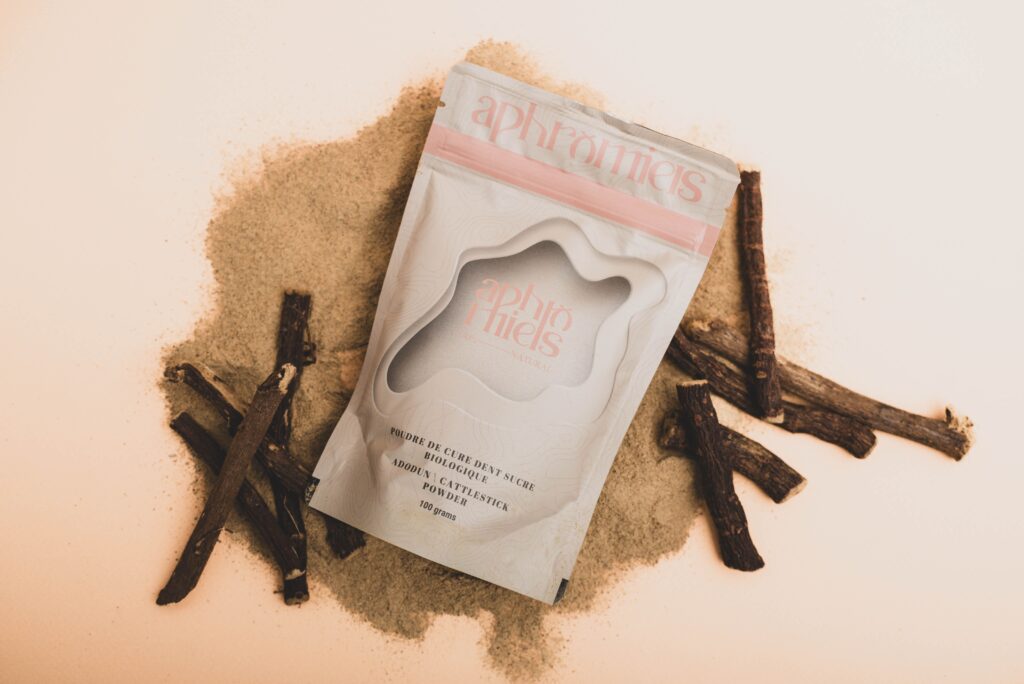
Dosage and usage of Carpolobia Lutea / Sweet chewing stick
Carpolobia lutea is available in various forms, including:
-
- Root
-
- Stems
-
- Capsules
-
- Tincture
-
- Herbal tea
The traditional way to use Carpolobia lutea is to chew the stick, suck out the sweet sap, and spit out the fiber.
For Westerners, chewing on a stick can be impractical. That’s why Sweet chewing stick is also sold in powder form. The powder is simply sucked until it loses its sweetness and the remaining fibers are spat out. The powder can also be brewed into a tea. Other convenient ways to use the sticks are to soak them in water, wine, or spirit to extract the sweetness. Tinctures made with a spirit will last for a year, while water extractions will only be safe to use within a few days.
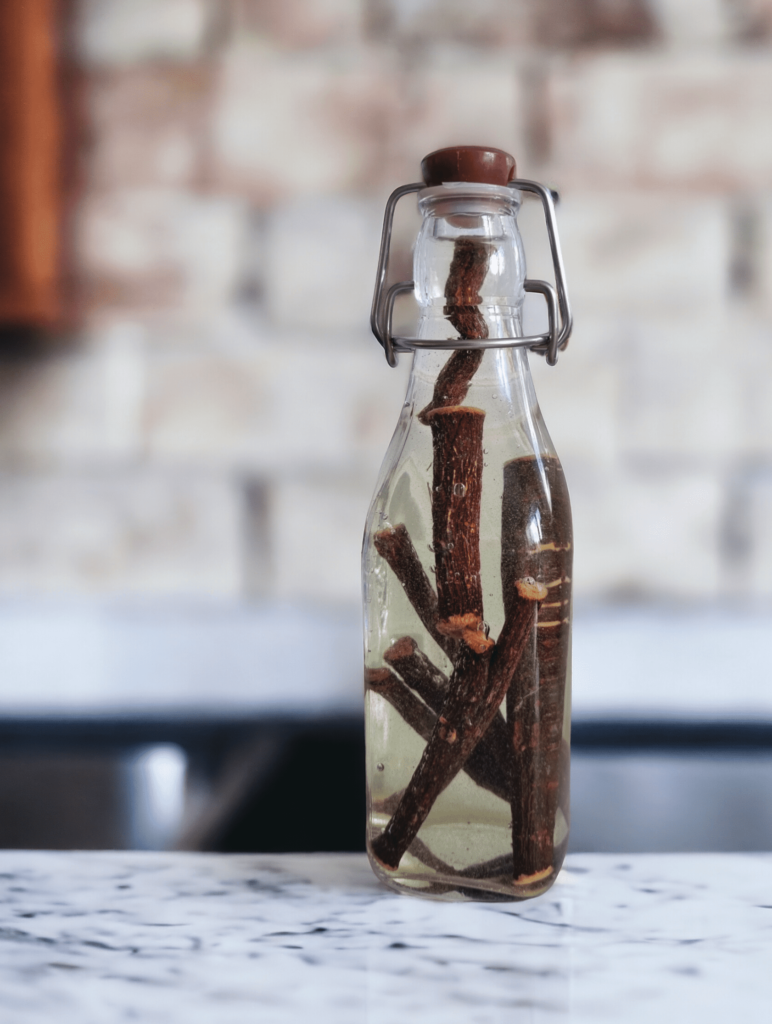
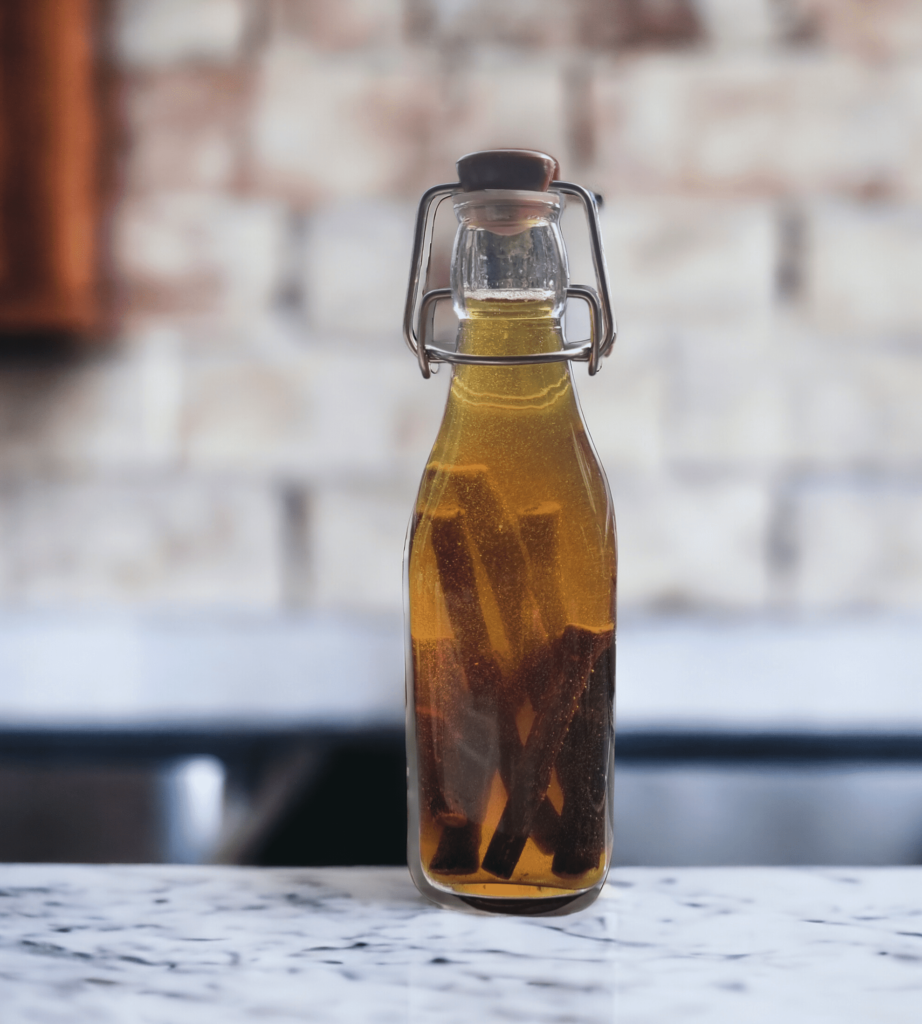
Our usage tips:
-
- Start with a low dose and gradually increase until you achieve the desired effect.
-
- If you have any medical condition or are taking medication, consult a healthcare professional before consuming Carpolobia lutea.
-
- Pregnant or nursing women should avoid consuming Carpolobia lutea.
If you experience any side effects, stop consuming Carpolobia lutea and consult a healthcare professional.
Possible associations with Carpolobia lutea
Carpolobia lutea, with its multiple benefits on sexual health, can be combined with other medicinal plants to enhance its effects or target specific issues. It can be associated with:
-
- With Tribulus terrestris: Known for its ability to increase testosterone levels and improve libido and erectile function, combining it with Carpolobia lutea could enhance these effects for better sexual performance.
-
- With Ginseng: Ginseng is renowned for its energizing properties and positive effect on erectile function. Combined with Carpolobia lutea, it could contribute to increased energy and sexual endurance.
-
- With Maca (Lepidium meyenii): This Andean plant is often used to boost libido and fertility. Its combination with Carpolobia lutea could offer an interesting synergy to enhance fertility and sexual vigor.
-
- With Epimedium (Horny Goat Weed): Known for its effects on improving blood circulation and reducing symptoms of erectile dysfunction, Epimedium, combined with Carpolobia lutea, can offer a comprehensive natural solution to enhance erectile function.
-
- With Asparagus racemosus (Shatavari): This plant is used in Ayurvedic medicine for its adaptogenic and aphrodisiac properties. Together, Asparagus racemosus and Carpolobia lutea can help combat stress to boost libido.
-
- With Mucuna pruriens: Rich in L-Dopa, a precursor to dopamine, Mucuna pruriens can improve mood and sense of well-being while also increasing libido. Adding Carpolobia lutea can intensify these effects on sexual health.
-
- With Ginkgo biloba: Ginkgo is famous for its action on blood circulation, especially in peripheral areas. It can be beneficial for those suffering from erectile dysfunction related to poor circulation. In combination with Carpolobia lutea, it can offer an improvement in blood circulation to the genital organs to help with achieving and maintaining erections.
The plant with multiple virtues
As the world increasingly seeks natural alternatives to enhance sexual health, Carpolobia lutea emerges as a promising option, supported by both centuries of traditional use and emerging scientific research.
It is a plant with multiple virtues that has many health benefits. Traditionally used in Africa, it is attracting more and more attention from the scientific community for its promising properties.
This plant is particularly effective for sexual health, memory, stress, anxiety, and digestion. Preliminary studies also suggest its potential in the treatment of Alzheimer’s disease.
Carpolobia lutea is not a miracle cure and may have side effects. Therefore, it is necessary to respect the recommended dosages, consult a healthcare professional before using it, and ensure that there are no contraindications.
In conclusion, Sweet chewing stick is a truly fascinating plant that deserves to be explored for its numerous health benefits.
Don’t forget to consult your doctor before incorporating Sweet Toothpick into your routine.
Additional links
-
- https://www.ncbi.nlm.nih.gov/pmc/articles/PMC4557236/
-
- https://guardian.ng/features/local-plant-boosts-sex-drive-brain-function-ulcer-fight/
-
- https://www.nottingham.ac.uk/research/groups/healthofolderpeople/news/2017-african-plant-extract-and-alzheimers-treatment.aspx
-
- https://www.sciencedirect.com/science/article/abs/pii/S1698031X14000338
-
- https://en.wikipedia.org/wiki/Carpolobia
-
- https://www.researchgate.net/publication/282129195_The_aphrodisiac_herb_Carpolobia_A_biopharmacological_and_phytochemical_review/link/5e77dcab299bf1892c0211aa/download?_tp=eyJjb250ZXh0Ijp7ImZpcnN0UGFnZSI6InB1YmxpY2F0aW9uIiwicGFnZSI6InB1YmxpY2F0aW9uIn19
